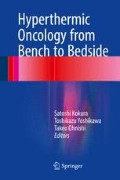Abstract
This chapter focuses on cell death, the cell cycle, and cell survival signal transduction pathways in mammalian cells. Environmental stresses induce many kinds of signal transduction pathways such as cell death signals and survival signals. Fate of the cells is dependent on those cellular responses. The gene products of tumor suppressor genes such as the p53 proto-oncogene and the products of other proto-oncogenes play important roles in these signaling pathways. The diverse pathways through which these elements interact with each other, and their close links to other nuclear and extranuclear signaling networks compel us to reconsider the concept of stress responses to cancer therapies such as hyperthermia, radiation and anti-tumor drugs.
Access this chapter
Tax calculation will be finalised at checkout
Purchases are for personal use only
References
Hollstein M, et al. p53 mutations in human cancers. Science. 1991;253:49–53.
Slee EA, et al. To die or not to die: how does p53 decide? Oncogene. 2004;23:2809–18.
Kirita T, et al. A new strategy for cancer therapy based on a predictive indicator. Hum Cell. 2001;14:1–6.
Yasumoto J, et al. Apoptosis related gene expression after hyperthermia in human tongue squamous cell carcinoma cells harboring wild-type or mutated-type p53. Cancer Lett. 2004;204:41–51.
Tabuchi Y, et al. Genes and gene networks in the apoptosis induced by heat stress in human leukemia U937 cells. Therm Med. 2011;27:31–40.
Kajihara A, et al. Protein microarray analysis of apoptosis-related protein expression following heat shock in human tongue squamous cell carcinomas containing different p53 phenotypes. Int J Hyperthermia. 2008;24:605–12.
Ota I, et al. Transfection with a mutant p53 gene inhibits heat-induced apoptosis in a head and neck cell line of human squamous cell carcinoma. Int J Radiat Oncol Biol Phys. 2000;47:495–501.
Durocher D, et al. DNA-PK, ATM and ATR as sensors of DNA damage: variations on a theme? Curr Opin Cell Biol. 2001;13:225–31.
Takahashi A, et al. ATM is the predominant kinase involved in the phosphorylation of histone H2AX after heating. J Radiat Res. 2010;51:417–22.
Wang X, et al. p53-Dependent signal transduction induced by stress. J Radiat Res. 1997;38:179–94.
Ohnishi K, et al. Heat-induced p53-dependent signal transduction and its role in hyperthermic cancer therapy. Int J Hyperthermia. 2001;17:415–27.
Ohnishi T, et al. Signal transduction of radiation and/or hyperthermic cancer therapies. Curr Signal Transduct Ther. 2010;5:231–6.
Nakagawa Y, et al. Depression of p53-independent Akt survival signals in human oral cancer cells bearing a mutated p53 gene after exposure to high-LET radiation. Biochem Biophys Res Commun. 2012;423:654–60.
Kajihara A, et al. Thermal medicine review heat-induced signal transduction pathways leading to cell death and cell survival in cancer cells. Termal Med. 2009; 255:1–11.
Author information
Authors and Affiliations
Corresponding author
Editor information
Editors and Affiliations
Rights and permissions
Copyright information
© 2016 Springer Science+Business Media Singapore
About this chapter
Cite this chapter
Ohnishi, T. (2016). Cellular Responses in Signal Transduction Pathways Induced by Hyperthermia. In: Kokura, S., Yoshikawa, T., Ohnishi, T. (eds) Hyperthermic Oncology from Bench to Bedside. Springer, Singapore. https://doi.org/10.1007/978-981-10-0719-4_5
Download citation
DOI: https://doi.org/10.1007/978-981-10-0719-4_5
Published:
Publisher Name: Springer, Singapore
Print ISBN: 978-981-10-0717-0
Online ISBN: 978-981-10-0719-4
eBook Packages: MedicineMedicine (R0)

